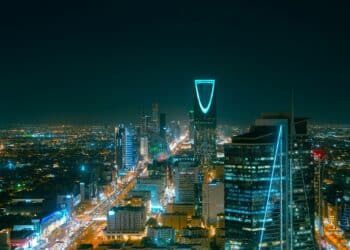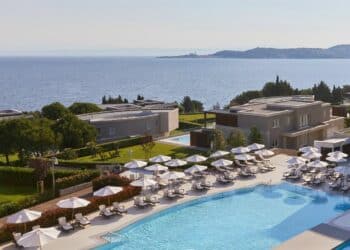 The hospitality industry in Dubai has hit a new milestone, with 100,000 rooms open across its hotel and hotel apartment inventory following the opening of The Westin Dubai, Al Habtoor City.
The hospitality industry in Dubai has hit a new milestone, with 100,000 rooms open across its hotel and hotel apartment inventory following the opening of The Westin Dubai, Al Habtoor City.
Celebrating the key achievement, industry heavyweights from Dubai’s tourism industry came together to mark the city’s milestone achievement, including His Excellency Helal Saeed Almarri, director general of DTCM, and Mohammed Khalaf Al Habtoor, vice chairman and CEO of Al Habtoor Group, together with Marriott International’s Alex Kyriakidis, president and managing director Middle East and Africa, and Guido de Wilde, chief operating officer Middle East.
Commenting on the occasion, His Excellency Almarri said: “For the hotel sector, high demand from international travellers, and the consequent growth in tourism volumes, has been the cornerstone of fostering continued investment in supply enhancement, which has seen us cross this historic 100,000 rooms threshold. This has been a journey undertaken collaboratively and achieved through the enduring strength of our public and private partnerships that underscore Dubai’s maturing prominence on the world stage.”
Mohammed Al Habtoor, vice-chairman & CEO, Al Habtoor Group added: “The Al Habtoor Group continues to grow in unison with the economy of Dubai. Our vision is in line with the Government. We now have seven quality hotels in the city contributing significantly to the hospitality sector here. The addition of The Westin Dubai – Al Habtoor City adds another 1,004 superior rooms to Dubai. It is the largest Westin in Europe Middle East and Africa. It complements our other hotels within the Hotel Collection at Al Habtoor City. Our hospitality portfolio in Dubai is unique and draws people to the city, offering travelers with a multitude of luxury choices.”
Looking to the future, Dubai Tourism expects occupied room nights in hotels and hotel apartments to reach 35.9 million, representing a 10.8% compound annual growth rate (CAGR) from the end of 2015 to the end of 2018. As such, the overall room supply is expected to reflect similar growth, reaching 134,000 rooms by the end of 2018.
With demand increasing, overall projected occupancy rates until 2018 are expected to be maintained at a strong 77% approximately, ensuring Dubai’s hotel industry retains its attractiveness while allowing the emirate to build stronger competitiveness as a global tourist destination.
Furthermore, buoyed by a dynamically evolving and diversified destination offering, Dubai Tourism expects to expand guests’ overall Length of Stay (to four days by 2018. This is in addition to volume growth in international overnight visitors spurred by increasing air connectivity and seat capacity primarily delivered by Dubai’s two home-grown carriers, Emirates Airline and flydubai. Both these factors collectively drive sustained demand for paid accommodation. Ultimately, the growth in the city’s hotel capacity, the diversity of its accommodation mix and the breadth of its growing proposition, supported by airlift and city-wide infrastructure, are all aimed at cohesively creating a multiplier effect on Dubai’s Gross Domestic Product (GDP) and furthering tourism’s contribution to economic growth over the coming years.
His Excellency Almarri added: “The hotel and hospitality sector continues to share strong interdependencies and complementarities with the growth of tourism, aviation, infrastructure and other destination proposition enhancements, as it has done historically. The concerted efforts of Dubai Government to continually evolve the emirate’s transport and logistics infrastructure via committed investments for capacity expansion through to 2020, coupled with Dubai Tourism’s enablement of various tourism assets, ranging from theme parks and cultural districts to specialised event venues and entertainment offerings, have laid stable foundations to systematically grow visitation volumes to the city in line with 2020 targets. As such, they also prudently influence development plans for the hotel sector.”


































































